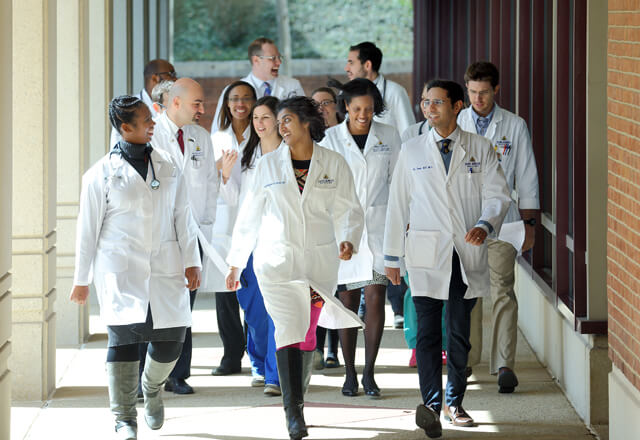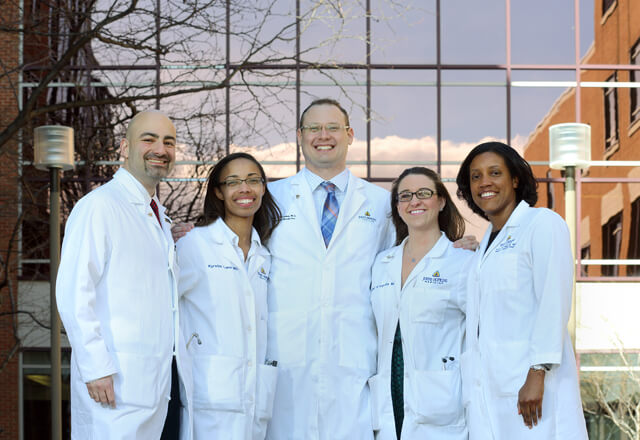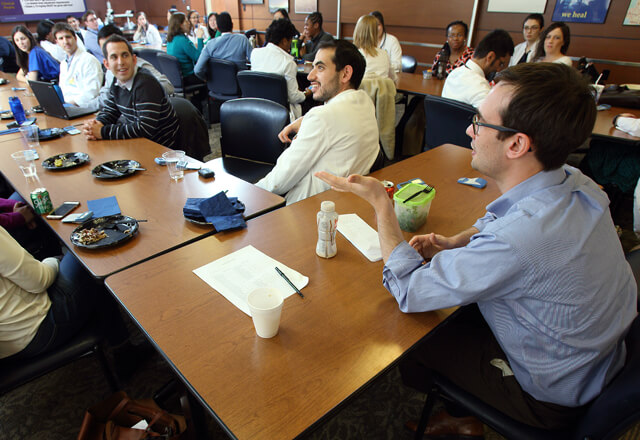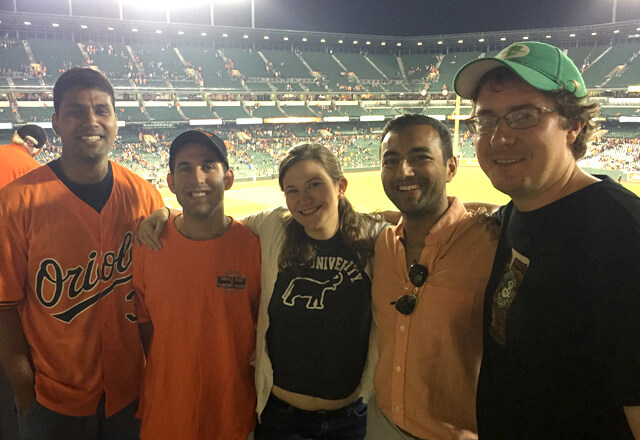About the Program

At Johns Hopkins Bayview, our residents become outstanding leaders and healers. Part of a world-renowned research university, our residents benefit from unmatched resources in medical education, clinical care and research.
As a medium-size program, our faculty get to truly know each resident and are able to offer individualized mentorship. Each resident is encouraged to "leave their fingerprints on the profession," whether by being the first to help a patient understand a difficult diagnosis, conducting and disseminating translational research, working with community leaders to improve health awareness, advocating nationally on health policy programs, or traveling abroad to address global health issues.
Graduates of our program match at top fellowship programs, assume roles as residency and fellowship program directors, take positions heading city and state health departments, and join innovative clinical practices at the cutting edge of primary care delivery.
Our Mission
To train physicians who embrace science and have the curiosity, desire, and commitment to find and fortify the dignity that is in each patient. Our program impresses upon physicians that it is their joyful opportunity and obligation to dedicate themselves to make medicine the best possible public trust and to strengthen and advance the profession.
Unique to Johns Hopkins Bayview
Resources of a World-Class Academic Medical Center
The Johns Hopkins Bayview Medical Center is a major teaching, clinical and research facility of The Johns Hopkins University School of Medicine and is a member institution of the Johns Hopkins Health System. Our faculty are full-time staff of the SOM and are internationally recognized for their clinical, research, and educational achievements. Many faculty also hold joint appointments in the Johns Hopkins Bloomberg School of Public Health, an institution that offers a multitude of educational and scholarship opportunities for our housestaff. Our campus is also fortunate to be home to two branches of the National Institute of Health.
Exceptional Training With a Personal Touch

Being a medium-size internal medicine training program, we are fortunate to be able to provide our trainees with individual attention and focused mentorship. We consider this "Hopkins with a personal touch." We are proud to work closely with each of our housestaff to help them achieve their specific goals and objectives during their training. Johns Hopkins Bayview alumni often speak of this as the greatest strength of our program and one of the things that sets us apart from other top internal medicine training programs.
As a result of this personal focus, combined with the academic excellence and reputation of our housestaff and program, our residents have an unsurpassed record of obtaining subspecialty fellowships at leading academic institutions of their choice, as well as top jobs in health departments and academia.
A Tradition of Innovation
Johns Hopkins Bayview has continued to be on the forefront of innovation in graduate medical education. We have a rich history of cutting-edge curricula that have been designed to meet the needs and wishes of our housestaff.
Johns Hopkins Bayview's Aliki Initiative
In 2007, the Center for Innovative Medicine at Johns Hopkins Bayview Medical Center launched the Aliki Initiative, a novel curriculum in patient-centered care for internal medicine residents and medical students. The program emphasizes that optimal medical care can be delivered only if medical treatments are tailored to the individual patient. Supported through the generosity of Mrs. Aliki Perroti, the program has been very highly evaluated by residents, medical students and, most importantly, patients.
Support for Resident-Led Research
The Johns Hopkins Department of Medicine and Center for Innovative Medicine Prism Grants provide up to $5000 of funding for resident-led mentored research projects in a wide array of topics, including but not limited to, basic sciences, clinical and translational sciences, public health, education, patient safety, and quality improvement. Both quantitative and qualitative studies are encouraged. Each applicant identifies a primary mentor who will assist them through the application process. If the grant is awarded, mentorship would continue through the completion of the award. Collaborations outside of Hopkins are allowed, but the applicant will need to identify one Hopkins-based mentor. In addition, each applicant will identify the CIM theme that best reflects the content of their proposal:
- The Good Doctor & Good Nurse
- Precision Medicine
- Medicine for the Greater Good
The grants were introduced in 2019 and, so far, a total of 16 grants have been funded. The 2022/2023 cycle begins in October 2022.
-
Jashalynn German, "The Impact of an Obesity Medicine Curriculum on Internal Medicine Residents’ Knowledge, Self-Efficacy, and Physician-Nurse Collaboration Regarding Obesity Care" (Mentor: Kimberly Gudzune, MD MPH)
Scott Binder, "Evaluation of the Variability of QTc Intervals Among Patients with Long QT Syndrome Types 1, 2 and 3" (Mentor: Andreas Barth)
George Hung, "Elucidating the Exosomal Mechanisms of Aged Mesenchymal Stem Cell Rejuvenation" (Mentor: Peter V Johnston)
Lingsheng Li, "Quality Improvement Project to Promote Humanism in Discharge Summaries" (Mentor: Janet Record)
Anna Tucker, "The integration of MSK Ultrasound Training into Internal Medicine Resident Education" (Mentors: Myma Albyda and Gigi Liu)
-
Olivia Bernal, "Multidisciplinary Goals of Care Communication Interventions in the Intensive Care Unit: A Scoping Review" (Mentor: David Wu)
Kacey Chae, "Impact of an Obesity Medicine Curriculum on Internal Medicine Residents’ Knowledge, Self-Efficacy, Practice Habits, and Physician-Nurse Collaboration Regarding Obesity Care: Phase 2" (Mentor: Kimberly Gudzune)
David Hurwitz, "Building a Resident-Run Telehealth Model for Medicare Annual Wellness Visits" (Mentor: Jessica Colburn)
Kellen Knowles, "Harnessing the Power of Digital Health to Support Caregivers and Impact Patient Outcomes Following Myocardial Infarction" (Mentor: Seth Martin)
Kai-Li Liang, "The Role of Urgent Care Clinics in Identifying Immune-Related Adverse Events and Preventing Hospitalizations for Thoracic Oncology Patients" (Mentor: Josephine Feliciano)
Eric Moughames, "Elucidating the Relationship Between African Genetic Ancestry and COPD-Related Outcomes" (Mentor: Nadia Hansel)
Mfon Umoh, "The Association of Preoperative Levels of Tumor Necrosis Factor-α Receptor-1 with Postoperative Delirium in Older Hip Fracture Repair Patients" (Mentor: Esther Oh)
-
Vivian Altiery De Jesus, "Assessing Learning Needs in Bioethics of Internal Medicine Residency Programs" (Mentor: Paul O’Rourke)
Daniel Li, "Changes in Initial Staging and Overall Survival in a Multidisciplinary Liver Cancer Clinic from 2019-2021" (Mentor: Mark Yarchoan)
Emily Gao, "Qualitative Analysis of the Alcohol Use Experiences of Women Undergoing Liver Transplant for Alcohol-Related Liver Disease" (Mentor: Geetanjali Chander)
Daniel Thomas, "Building a Cardiac Catheterization Decision Aid that Enhances Informed Consent and Overcomes Systemic Disparities" (Mentor: Jeff Trost)
Unique Internship Experiences
We offer several highly-rated curricula during internship that help our trainees develop a strong foundation to become internists of the highest type. In the first half of the year, all interns spend one month on the Immersions in Outpatient Practice and Foundations of Clinical Excellence rotations, learning to organize ambulatory patient visits, important interviewing skills, and proficiency in the psycho-social aspects of medical practice. During the month, interns participate in one-on-one intensive learning sessions with faculty using role play and simulated patients. Interns also learn and refine their physical examination skills in small group sessions with leading faculty members. In the second half of the year, all interns spend one month learning the fundamentals of evidence-based medicine and quality improvement. Interns will be taught in basic principles of quality improvement and patient safety, clinical decision-making, critical appraisal of the literature, and clinical epidemiology. Interns have the opportunity to pursue a quality improvement project and investigate the evidence for a clinical question or practice of interest. Half-day workshops offer residents time to explore ambulatory-medicine topics in depth. Some of the topics covered are: HIV care, the use of advance directives, women's health, personal chart auditing, prevention and screening, and clinical skills in the managed care setting, each taught by leading faculty in a small group setting.
Outstanding Housestaff Scholarship

We are extraordinarily proud of the outstanding accomplishments of our residents. We support all of our residents in creating scholarly products during their residency training. These have included first-author peer-reviewed publications in leading medical journals, award-winning presentations at regional and national conferences, innovative interventions for quality improvement and medical education, and creative public health outreach projects in the Baltimore community and beyond.
To support our talented residents, Dr. Khalil Ghanem serves as a scholarship coach who meets with each of our housestaff regularly and helps them identify potential mentors and collaborators. We offer educational conferences geared toward helping residents hone their research and presentation skills. We offer our residents access to statistical support through the Johns Hopkins BEAD (Biostatistics, Epidemiology, and Data Management) team. We offer administrative support through our library and media services to help prepare manuscripts and presentations. Finally, we provide funding for residents to present their work at regional and national conferences.
Promoting Wellness and Partnership Beyond the Hospital Walls
At Johns Hopkins Bayview, our commitment to patients does not end as they leave our campus. We are proud to have a robust and renowned program dedicated to improving the health and well-being of our greater community.
Medicine for the Greater Good
Formally established in 2013 at Johns Hopkins Bayview, Medicine for the Greater Good is an initiative and formal curriculum that seeks to train and educate medical residents in bridging the gap in health disparities between the hospital and the community. Since the the start of this initiative, 82 residents and students have engaged in nearly 300 projects to benefit Baltimore city residents.
Opportunities for National and International Experiences
We are delighted to support all of our trainees’ unique interests, including involvement in national and global health opportunities. Here are some examples of recent housestaff opportunities outside of Baltimore:
- International clinical and research electives in China, India, Barbados, Zambia, South Africa, and Uganda
- Clinical electives at the Indian Health Service sites, such as the Tuba City Indian Medical Center of the Navajo Nation in Arizona
- Research and public health advocacy at the Baltimore and New York City Health Departments
- Research at NIH institutes, such as the National Heart, Lung, Blood Institute
- Research at government agencies, such as the Agency for Healthcare Research and Quality and the Center for Medicare & Medicaid Services
- Research at non-profit organizations, such as the National Resources Defense Council
Embracing Diversity
Hardly any other residency program serves as diverse a patient population, in terms of socioeconomic status, medical conditions and ethnicity, as the program at Johns Hopkins Bayview. This aspect adds a valuable richness to education for medical residents.
The Johns Hopkins Bayview Internal Medicine Residency Program was awarded a $25,000 grant from the Provost's Office of Johns Hopkins University as part of the University's Mosaic Initiative. The residency program used the funding to augment its efforts to attract the most talented underrepresented minority students from across the country to our residency program, ensure a most outstanding experience for those residents, and to continue to foster a culture of diversity and inclusiveness within the program.
The Medical Center and the University also promotes diversity among faculty, staff and students, as well as patients and visitors, and provide a welcoming environment for residents of different cultures and backgrounds. Many residents, staff, and faculty have chosen to join the OUTList , a directory of lesbian, gay, bisexual, or transgendered people that are part of Hopkins.
Twenty-five percent of the current housestaff are from ethnic and racial groups that traditionally are under-represented in medicine.
For more information about diversity at Johns Hopkins Bayview, visit the Johns Hopkins Diversity and Cultural Competence website.
Commitment to Housestaff Wellness

At Johns Hopkins Bayview, we believe that physician well-being involves a balance of personal and professional aspects of life. We are proud to actively nurture a supportive atmosphere to promote the health and wellness of our housestaff and their families.
Dr. Joseph Carrese, a professor in the Division of General Internal Medicine, facilitates weekly support groups for interns and residents with protected time incorporated in our noon conference curriculum throughout the year. This has been a highly regarded aspect of our program. In addition, our program is happy to provide complimentary gym membership to all of our housestaff.
Our housestaff-led Wellness Committee plans multiple formal events throughout the year and we are honored to support their programming. In addition, residents often come to view one another as a second family, arranging dinners, athletic events or other fun activities in the Baltimore area.
Finally, we have several annual celebrations where the significant others and families of residents and faculty can get to know their Johns Hopkins Bayview families. These include the Winter Holiday Party and the Evening for Arts & Medicine, a showcase of the artistic talents of residents, faculty, and their significant others (including children), as well as several other social events throughout the year.
Other relevant resources related to well-being in residency include the mySupport, Johns Hopkins Medical Auxiliary and Wellness at Johns Hopkins.


